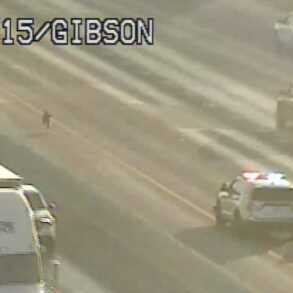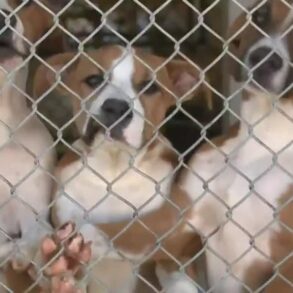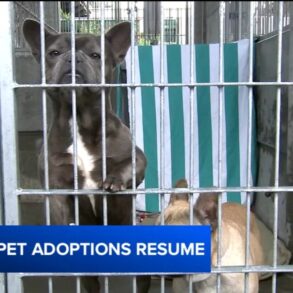California lawmakers are set to announce three bills Tuesday to crack down on the sale of puppies from out-of-state mass breeders, proposing to ban popular pet-selling websites and other middlemen from operating in the state, increase oversight of dog sellers and strengthen consumer protections.
The move comes after a Times investigation last year found that truckloads of doodles, French bulldogs and other expensive dogs from profit-driven mass breeders pour into the state from the Midwest, feeding an underground market where they are resold by people claiming to be small, local home breeders.
California had previously sought to end the puppy mill pipeline when it became the first state in the nation to ban pet stores from selling commercially bred dogs beginning in 2019. The law, however, did not apply to online pet sales, which grew rapidly during the COVID-19 pandemic.
Assemblymember Marc Berman (D-Menlo Park) said his bill would close the loophole in California’s pet retail ban by prohibiting brokers from selling or shipping dogs to consumers in the state. Assembly Bill 519 defines a broker as any person or business that sells or transports a dog bred by someone else. That would include major national pet retailers such as PuppySpot, Puppies.com and Premier Pups as well as California-based operations that market themselves as pet matchmakers.
“The broker ban is the big swing, it’s one of the final valves that we can shut off for the puppy mill pipeline into California,” Brittany Benesi, senior legislative director at the American Society for the Prevention of Cruelty to Animals, which is co-sponsoring the three bills with the San Diego Humane Society.
The bill would not apply to police dogs and service animals. Consumers could still buy directly from breeders, including those out of state.
“The Times’ reporting last fall really uncovered this major underground market of middlemen and middlewomen who are giving the impression that these are animals they raised and they’re selling them to Californians when in reality they’re just importing these animals from out-of-state puppy mills,” Berman said.
A bill by Assemblymember Steve Bennett (D-Ventura) would void pet purchase contracts involving California buyers if a broker requires a nonrefundable deposit or if they fail to provide the name of the breeder before payment. Sellers would be required to return the payment within 30 days under AB 506, with the bill authorizing the California attorney general to enforce that provision. Bennett said the measure would ensure consumers have the information they need before purchasing a family pet.
“The bottom line is the contract is void if you don’t accurately identify the source” of the dog, he said.
Some pet sellers don’t publicize dog breeders they use, instead offering general assurances to prospective buyers that they work with trusted partner breeders. The Times found some brokers using such language were actually buying in bulk from mass breeding facilities.
Others who sell dogs on social media, online marketplaces or through their own websites claim to be small local breeders, but The Times traced microchip numbers for the dogs they sold to out-of-state puppy mills.
In California, all dogs brought into the state for sale require a certificate issued by a federally accredited veterinarian listing where the animal came from, its destination and verification it is healthy to travel.
The California Department of Food and Agriculture has long received those health certificates from other states by mistake — the records are supposed to go to county public health departments — and, in recent years, made it a practice to immediately destroy them. Dog importers who were supposed to submit the records to counties largely failed to do so.
The Times investigation analyzed the movement of more than 71,000 dogs into California since 2019, when the pet retail ban went into effect. The travel certificates showed how a network of resellers — including ex-cons and schemers — replaced pet stores as middlemen. Dogs brought from out of state were often rebranded as California-bred and, in some cases, pet owners were left heartbroken or facing thousands of dollars in veterinary bills when their new puppies got sick or died.
Reporters identified dozens of people — some using fake names and addresses — who each were listed as having imported more than 80 dogs into the state in the years after the retail ban. Some were listed on travel certificates as the destination for more than 500 puppies.
After The Times’ reporting, lawmakers and animal advocates called on the state agriculture department to stop “destroying evidence” and preserve the travel certificates that could help establish which dogs are illegally being imported into the state. The department began preserving the records thereafter, but released them to The Times with significant redactions.
State Sen. Tom Umberg (D-Orange), chair of the Senate Judiciary Committee, said he is moving to ensure the records are available to the public. Under his bill, SB 312, pet sellers would be required to share the travel certificate with the state agriculture agency, which would then post them online for a yet-to-be-determined period of time. The bill would also ensure the records remain unredacted and available to the public beyond that time.
The travel records list the name and address of buyers and sellers when a dog is coming into California from another state. The disclosure of buyers’ personal information is likely to raise privacy concerns, but Umberg said he hopes lawmakers will conclude the societal benefit of ensuring that animals and consumers are protected from bad actors outweighs any reluctance. In many cases, a dog’s microchip number is listed on the documents, which can help pet owners determine where their dog came from.
“This transparency provides a level of accountability that does not exist in California right now,” Umberg said.
Julianna Tetlow, senior director of government relations for the San Diego Humane Society, said it’s time the state utilizes pet travel certificates as an essential transparency tool.
“The problem that we’re really trying to get at right now is that folks are unintentionally propping up the puppy mill industry from the Midwest because they think they are getting locally sourced or locally bred puppies,” Tetlow said. “The main goal with this [legislative package] is to prevent that deception.”
More to Read
This post was originally published on this site be sure to check out more of their content.











































